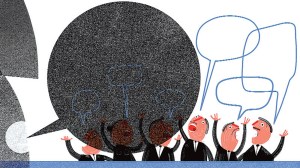The science of defeat
Athletes seem to choke when they focus on the outcome—the final score

Melissa Hunfalvay feels Claudio Reyna’s pain. Not the pain caused by the sprain in Reyna’s knee—an injury the captain of the defeated US World Cup soccer team sustained last fortnight while conceding a goal in an all-important match against Ghana. As a sport psychologist, Hunfalvay understands the sort of pain that is far worse, that caused Reyna to clutch his head, rather than his knee, as he was carted off the field after the ball was ignominiously stripped from him by Ghana’s Haminu Draman, who went on to score.
‘‘I should have probably just put it up the field,’’ Reyna said afterward. ‘‘I just made the wrong decision there.’’ Hunfalvay thinks she knows why experienced players such as Reyna make elementary mistakes in the heat of battle. Golfer Phil Mickelson similarly suffered a spectacular meltdown in the US Open a week ago.
Hunfalvay said she has helped athletes get past crushing defeats, and play in big matches with the same flair and skill they show in practice. In this, she is part of a wide-ranging effort to apply the insights of psychology and psychiatry to sports. Experts are hooking athletes up to devices that measure heart rate and stress hormones, track eye movement, and even study brain activity patterns.
Hunfalvay believes that one of the reasons athletes under stress do not perform at their peak is that they have stopped taking in enough information or are focused on the wrong things. Using an infrared camera that picked up eye movements, Hunfalvay found that a college tennis player who was phenomenal at returning serves in practice but dreadful in competition was focused—in the heat of competition—on the back fence, the trees and the net post. By learning to look at particular aspects of the opposing player’s stance and racquet motion as he went through his usual footwork routine, Hunfalvay said, the player quickly turned into a star in competition. In a soccer match, she added, experienced players sometimes focused on the gaps in the opposing team’s formation, instead of on the opposing players themselves.
Aynsley Smith, an expert in sport psychology and the research director at the Mayo Clinic’s Sports Medicine Center, said tensing and relaxing large muscles before an event can lead to more fluid play. She also trains athletes to be careful with their expectations.
In one experiment, Smith and other researchers hooked 16 golfers up to devices that measured heart rate, levels of the stress-related hormone cortisol and grip force, and then simulated a high-pressure competitive environment. As measured stress levels rose, many of the golfers faltered.
Smith said athletes choke when they focus on outcomes—the final score. It’s better to focus on aspects of performance, which are the only things that are really under the athlete’s control, she said.
A soccer team, for instance, could ask: How quickly does it switch from defence to attack? How many passes are collected cleanly? How long does the team hold possession of the ball? It can be difficult to focus on anything, of course, when the memory of crushing defeat looms large.
Hap Davis, a sport psychologist who has worked with the Canadian national swim team, found that when athletes who didn’t make that country’s Olympic team were shown videos of their losing races, the grief they felt was so acute that their brain images resembled those of people suffering from major depression. ‘‘Following a major setback, this may be why many people will come back to the top but never really become champions again,’’ Davis said in an interview.
Davis tested a psychological technique known as cognitive behaviour therapy. Rather than wallow in their emotional response to the loss, the swimmers were encouraged to watch the videos again, this time to identify mistakes and ask how they would do particular things differently. Davis said most athletes understandably want to remember the performances that went well, not the ones that went badly. But after the experiment, which led to some of the swimmers setting Canadian records, the psychologist said it was clear that defeat could be very instructive. ‘‘Most of the time athletes will seek to not think about the failed performance, but on the successful performances, because they won’t want to feel depressed,’’ he said.
nkar Vedantam



- 01
- 02
- 03
- 04
- 05



























